|
|
|
Sort Order |
|
|
|
Items / Page
|
|
|
|
|
|
|
| Srl | Item |
| 1 |
ID:
159874
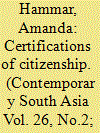

|
|
|
|
|
| Summary/Abstract |
A focus on certifications of citizenship as a range of inter-related practices of identity classification, categorisation, registration and validation, provides productive opportunities to explore the many ways that different authorities and/or different citizens engage with both the meaning and materiality of identity documents. At the heart of such practices is a complex politics of recognition that in turn is linked to the political economies of certification and of certificates themselves. A selection of African cases helps to highlight some of the paradoxes of certification – such as its simultaneous openings and closures – while pointing to the relationality of its multiple dimensions, including: the material, symbolic, social, spatial, temporal, demographic, political and institutional. These overlapping dimensions manifest in site-specific ways across different empirical contexts in Africa and Asia and beyond, making transnational conversations especially meaningful for deeper understandings of the complexities of the authority-certification-citizenship nexus.
|
|
|
|
|
|
|
|
|
|
|
|
|
|
|
|
| 2 |
ID:
163242
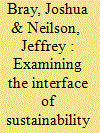

|
|
|
|
|
| Summary/Abstract |
Voluntary sustainability standards are used as both a means of securing coffee supply by large coffee firms and a development intervention to address rural poverty and environmental management in the Global South. Using a case‐study approach, we have examined the interface between a value‐chain sustainability programme and the livelihood trajectories of smallholder producers in upland Sumatra. Our research found the programme has had minimal impacts for coffee producers to date. The level of commitment required of producers appears incompatible with the particular way that coffee is currently embedded within local landscapes, livelihoods and poverty alleviation pathways. Various sustainability standards articulate a narrative of rural development underpinned by an assumption that agricultural modernisation is the preferred pathway out of poverty for rural households. As a result, there is some risk that sustainability programmes may be inadvertently attempting to encourage household investment in a particular kind of agriculture, which is intended to assist sustainability of supply, but is poorly aligned with prevailing processes of poverty alleviation. These observations are based on a detailed study of agrarian change among the Semendo people of South Sumatra province, where processes of rural development are far more complex than assumptions presented by mainstream sustainability standards.
|
|
|
|
|
|
|
|
|
|
|
|
|
|
|
|
| 3 |
ID:
171393
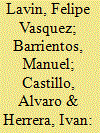

|
|
|
|
|
| Summary/Abstract |
Evidence from south-central Chile shows that the concentration limits for PM10 and PM2.5, defined by both the World Health Organization and national standards, are systematically exceeded, affecting approximately 10 million people. Among the sources of this pollution, firewood use accounts for the largest share. This study assesses whether consumers value environmental, social, and legal attributes associated with the firewood certification programs. We used a discrete choice model based on a sample of 500 households. According to our results, the price premium for certified firewood is about 10% in the most likely scenario, with those attributes closely related to private benefits having a higher value, compared to those of social benefits. We identify significant heterogeneity among respondents belonging to two different consumer classes: 1) those who are less price sensitive and are willing to pay for attributes related to certification; 2) those who are sensitive to prices and are not willing to pay for attributes related to certification. Since the second class includes about 46% of the sample, the implementation of certification programs could be jeopardized. Therefore, knowing this information helps us determine whether a certification system can foster the firewood industry transition to a more sustainable model.
|
|
|
|
|
|
|
|
|
|
|
|
|
|
|
|
| 4 |
ID:
171515


|
|
|
|
|
| Summary/Abstract |
Hydrogen can be produced from many different renewable and non-renewable feedstocks and technological pathways, with widely varying greenhouse gas emissions. For hydrogen to have a role in future low-carbon energy systems, it is necessary to demonstrate that it has sufficiently low carbon emissions. This paper explores how green hydrogen has been defined, reviews nascent green hydrogen characterisation initiatives, and highlights the main challenges that standards and guarantee of origin schemes must overcome to develop a market for green hydrogen.
Most existing green hydrogen initiatives are in Europe. In anticipation of a future market for green hydrogen, international standards are starting to be discussed by national and international standardisation organisations and policy makers. A range of approaches have been taken to defining green hydrogen and guarantees of origin. These vary on whether green hydrogen must be produced from renewable energy, on the boundaries of the carbon accounting system, the emission thresholds at which hydrogen is considered green, and on which feedstocks and production technologies are included in the scheme. Decisions on these factors are often influenced by other national and international standards, and the legal framework in which the green hydrogen supply chain operates.
|
|
|
|
|
|
|
|
|
|
|
|
|
|
|
|
| 5 |
ID:
145666
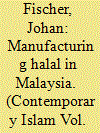

|
|
|
|
|
| Summary/Abstract |
In Arabic, halal literally means ‘permissible’ or ‘lawful’. Halal is no longer an expression of an esoteric form of production, trade and consumption, but part of a huge and expanding globalized market in which certification, standards and technoscience play important roles. Over the past three decades, Malaysia has become a world leader in the global expansion of halal markets. This has come about in large part because the state and government of Malaysia have taken on the role of halal-certifying authority within the country. In effect, it has certified, standardized and bureaucratized halal production, trade and consumption. Based on fieldwork in Malaysia, this article explores how manufacturing companies understand and practise halal certification, standards and technoscience. I argue that while existing studies of halal overwhelmingly explore micro-social aspects such as the everyday consumption among Muslim groups, ‘the bigger institutional picture’ that frames such consumption production and regulation are not well understood. By studying halal production, I provide an ethnography of the overlapping technologies and techniques of production and regulation that together warrant a product as ‘halal’ and thereby help to format the market.
|
|
|
|
|
|
|
|
|
|
|
|
|
|
|
|
| 6 |
ID:
144849
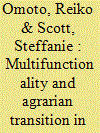

|
|
|
|
|
| Summary/Abstract |
Processes of globalisation in the conventional food provision system have had widespread negative impacts on small-scale farmers. Yet, alternative food networks, which are characterised by more sustainable production/consumption practices and fairer trade relations, have increasingly been ‘going global’ and, in the process, have been integrating small-scale farms in the South. One such high-value export-led commodity is certified organic shrimp. International third-party certification schemes are becoming popular as a tool to verify the intangible attributes of such commodities. Using concepts of multifunctionality and agrarian change, this paper examines the implications of introducing an international environmental certification programme to a site where the ‘peasantry’ has been preserved and has limited integration in the global agro-food system. Drawing on a case study that examines the first certified organic shrimp production project in Vietnam, this paper concludes that the current movement towards post-productivism in the global North has potential to keep local farming practices in the global South by justifying the value of peasant-like production methods through international certification. As a result, the development path of agrarian transition might be reshaped into a form not necessarily pursuing industrialisation. This leads to the new interpretation of pre- and post-productivism beyond the North and South divide.
|
|
|
|
|
|
|
|
|
|
|
|
|
|
|
|
| 7 |
ID:
166399


|
|
|
|
|
| Summary/Abstract |
To address the problem of information asymmetry in renewable electricity markets, European governments have introduced certification schemes. While certification appears to be an increasingly important trade mechanism for renewable electricity, it is unclear to what extent certificate markets are functioning properly. In addition, countries have chosen very different designs for their certification schemes. In order to assess the performance of markets for Guarantee of Origin certificates in twenty European countries, we construct four market performance indicators and analyse their development over 2001–2016: the churn rate, price volatility, the certification rate and the expiration rate. We also investigate the relationship between market performance and two design features of certification schemes: the public/private nature of the certifier and the presence of an international standard. We find that, despite increasing shares of renewable electricity are being certified, certificate markets suffer from poor liquidity and very volatile prices. In addition, we conclude that adopting an international standard fosters the development of certificate systems.
|
|
|
|
|
|
|
|
|
|
|
|
|
|
|
|
| 8 |
ID:
156468


|
|
|
|
|
| Summary/Abstract |
The Chinese government faces a great challenge to safeguard the safety of the food supply chain due to the significant fragmentation of producers and weak institutional resources to monitor and enforce safety standards. Food safety in China has received escalating attention since the 2008 milk scandal. Mainly due to safety concerns, Chinese farmers adopt two separate production systems for the market and self-consumption, and thus, the so-called “One Farm Household, Two Production Systems” (OFH-TPS) has gained popularity in the recent years.
|
|
|
|
|
|
|
|
|
|
|
|
|
|
|
|
| 9 |
ID:
103462


|
|
|
|
|
| Publication |
2011.
|
| Summary/Abstract |
The objective of this paper is to provide a review on the latest developments on the main initiatives and approaches for the sustainability certification for biofuels and/or bioenergy. A large number of national and international initiatives lately experienced rapid development in the view of the biofuels and bioenergy targets announced in the European Union, United States and other countries worldwide. The main certification initiatives are analysed in detail, including certification schemes for crops used as feedstock for biofuels, the various initiatives in the European Union, United States and globally, to cover biofuels and/or biofuels production and use. Finally, the possible way forward for biofuel certification is discussed. Certification has the potential to influence positively direct environmental and social impact of bioenergy production. Key recommendations to ensure sustainability of biofuels/bioenergy through certification include the need of an international approach and further harmonisation, combined with additional measures for global monitoring and control. The effects of biofuels/bioenergy production on indirect land use change (ILUC) is still very uncertain; addressing the unwanted ILUC requires sustainable land use planning and adequate monitoring tools such as remote sensing, regardless of the end-use of the product.
|
|
|
|
|
|
|
|
|
|
|
|
|
|
|
|
| 10 |
ID:
116995


|
|
|
|
|
| Publication |
2012.
|
| Summary/Abstract |
The rapid expansion of biofuel production and consumption has raised concerns over the social and environmental sustainability of biofuel feedstock production, processing and trade. The European Union (EU) has thus balanced its commitment to biofuels as one option for meeting its renewable energy targets with sustainability criteria for economic operators supplying biofuels to member states. Seven voluntary "EU sustainability schemes" were approved in July, 2011 as a means to verify compliance. While mandated sustainability criteria have a strong environmental focus, a number of these voluntary schemes have social sustainability as a significant component of the requirements put forward for achieving certification. As several of these voluntary schemes are incipient, thereby limiting evidence on their effectiveness in practice, this analysis is based on a comparative analysis of the substantive content or 'scope' of these schemes and the likely procedural effectiveness of the same. Findings show that while some schemes have considerable coverage of social sustainability concerns, poor coverage of some critical issues, the presence of schemes lacking any social sustainability requirements, and gaps in procedural rules are likely to undermine the likelihood that social sustainability is achieved through these schemes or the EU sustainability policies lending credibility to them.
|
|
|
|
|
|
|
|
|
|
|
|
|
|
|
|
| 11 |
ID:
121385


|
|
|
|
|
| Publication |
2013.
|
| Summary/Abstract |
Following up the rather sobering results of the biofuels boom in Tanzania, we analyze the preconditions that would make large-scale oil production from the feedstock Jatropha curcas viable. We do this by employing an economic land evaluation approach; first, we estimate the physical land suitability and the necessary inputs to reach certain amounts of yields. Subsequently, we estimate costs and benefits for different input-output levels. Finally, to incorporate the increased awareness of sustainability in the export sector, we introduce also certification criteria. Using data from an experimental farm in Kilosa, we find that high yields are crucial for the economic feasibility and that they can only be obtained on good soils at high input rates. Costs of compliance with certification criteria depend on site specific characteristics such as land suitability and precipitation. In general, both domestic production and (certified) exports are too expensive to be able to compete with conventional diesel/rapeseed oil from the EU. Even though the crop may have potential for large scale production as a niche product, there is still a lot of risk involved and more experimental research is needed.
|
|
|
|
|
|
|
|
|
|
|
|
|
|
|
|
| 12 |
ID:
191903


|
|
|
|
|
| Summary/Abstract |
This article examines how flag states, port states, and the shipping industry have attempted to fulfill their obligations to carry out mandatory ship surveys and certification in response to challenges arising from the COVID-19 pandemic and provides guidance for future pandemics. Although the International Maritime Organization (IMO) Conventions do not have procedures to deal with the impacts of global pandemics on ship surveys and certification, the IMO has provided guidance via circular letters, taking a pragmatic and practical approach. Several flag states extended the validity of certificates by taking either a case-by-case or a blanket approach within the statutory maximum of three months. With regard to the extension beyond the statutory period of three months, flag states should consider requests using an evidence-based assessment on a case-by-case basis. Classification societies play an important role in the extension of the validity of certificates by providing their technical expertise and recommendations. Port state control serves as a safety net in the event that flag states do not comply with their obligations. In this regard, cooperation between flag states, port states, and classification societies is key to managing survey and certification during a pandemic. Moreover, the COVID-19 pandemic has demonstrated an accelerated need for the development of remote surveys. It has also illustrated a need to develop guidance on remote surveys under exceptional circumstances in order to respond to future pandemics.
|
|
|
|
|
|
|
|
|
|
|
|
|
|
|
|
| 13 |
ID:
105825


|
|
|
|
|
| Publication |
2011.
|
| Summary/Abstract |
This questionnaire analyzed the ongoing development of sustainability criteria for solid and liquid bioenergy in the European Union and further actions needed to come to a harmonization of certification systems, based on EU stakeholder views. The questionnaire, online from February to August 2009, received 473 responses collected from 25 EU member countries and 9 non-European countries; 285 could be used for further processing. A large majority of all stakeholders (81%) indicated that a harmonized certification system for biomass and bioenergy is needed, albeit some limitations. Amongst them, there is agreement that (i) a criterion on 'minimization of GHG emissions' should be included in a certification system for biomass and bioenergy, (ii) criteria on optimization of energy and on water conservation are considered of high relevance, (iii) the large variety of geographical areas, crops, residues, production processes and end-uses limits development towards a harmonized certification system for sustainable biomass and bioenergy in Europe, (iv) making better use of existing certification systems and standards improves further development of a harmonized European biomass and bioenergy sustainability certification system and (v) it is important to link a European certification system to international declarations and to expand such a system to other world regions.
|
|
|
|
|
|
|
|
|
|
|
|
|
|
|
|
| 14 |
ID:
119833


|
|
|
|
|
| Publication |
2013.
|
| Summary/Abstract |
The European strategy for the coming decades sets specific targets for a sustainable growth, including reaching a 20% share of renewables in final energy consumption till 2020. To achieve this target, a number of initiatives and measures have been in force. Europe, is currently the largest market for PV systems with more than 75% of the annual worldwide installations in 2011. The favourable European policies as well as the Member States' supporting legislations have resulted in high market growth for photovoltaics.
Applying PV technologies however, requires high qualified technicians to install, repair and maintain them. Until today, national markets have been growing faster than the skilled PV installers force can satisfy. The PVTRIN, an Intelligent Energy Europe action, addresses these issues by developing a training and certification scheme for technicians active in the installation and maintenance of small scale PV systems. During the implementation of the action, a market research was conducted in the six participating countries in order to record the stakeholders' attitudes, perceptions and considerations and to adapt the training methods, tools and materials to the national PV industry requirements and markets' needs. Indicative results of this analysis as well as the current situation regarding relevant training and certification schemes are presented in this paper.
|
|
|
|
|
|
|
|
|
|
|
|
|
|
|
|
| 15 |
ID:
171426


|
|
|
|
|
| Summary/Abstract |
This paper examines the methods and input data used to assess the energy performance of residential buildings. The work concentrates on the assessment methods used to generate Energy Performance Certificates, under the European Energy Performance in Buildings Directive, for existing residential properties in the six largest European countries: UK, France, Germany, Spain, Italy and Poland. Buildings are associated with 40% of final energy consumption across the European Union however this paper reveals significant variation in the methods used to identify and assess this energy consumption. The research indicates that best-practice sharing between different countries governed by the same framework is not always evident and, by taking different approaches, each country is likely to draw different conclusions about their building stock, and how to market transform these dwellings in the future.
|
|
|
|
|
|
|
|
|
|
|
|
|
|
|
|
| 16 |
ID:
109471


|
|
|
|
|
| Publication |
2011.
|
| Summary/Abstract |
Fairtrade market growth is characterised by expansion and exclusion in terms of producer opportunity. This paper draws producers in the Pacific region into the debate, analysing the development context among these small-island developing states and, specifically, the practices and principles of four 'ethical' enterprises. The analysis reveals that the unique and complex context in which these organisations operate is at odds with Fairtrade's requirements, standards and assumptions. The paper highlights the need for contextually relevant requirements and principles, and the likelihood of alternative governance arrangements and actors, for an inclusive Fairtrade system and market in the region.
|
|
|
|
|
|
|
|
|
|
|
|
|
|
|
|
|
|
|
|
|